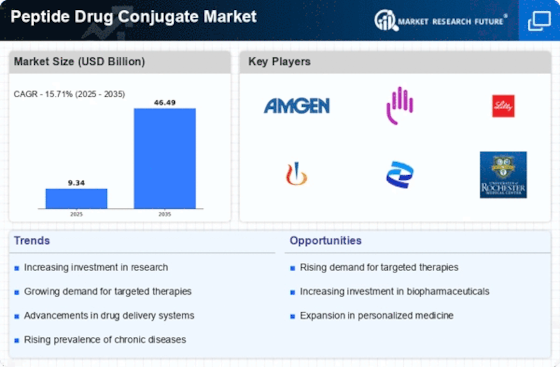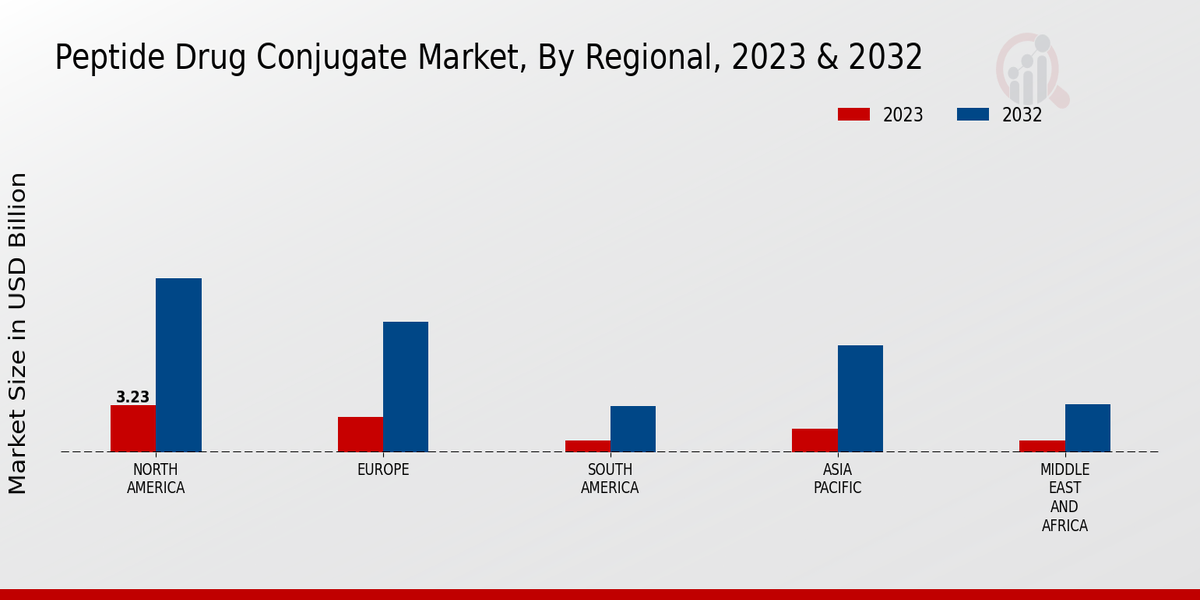Increasing Prevalence of Chronic Diseases
The rising incidence of chronic diseases such as cancer, diabetes, and autoimmune disorders is a primary driver for the Peptide Drug Conjugate Market. As these conditions become more prevalent, the demand for innovative therapeutic solutions intensifies. Peptide drug conjugates, known for their ability to deliver drugs directly to target cells, are gaining traction as effective treatment options. According to recent estimates, the global burden of chronic diseases is expected to rise significantly, leading to an increased focus on precision medicine. This trend suggests that the Peptide Drug Conjugate Market will likely experience substantial growth as healthcare providers seek more effective and targeted therapies to manage these complex diseases.
Rising Awareness of Personalized Medicine
The growing awareness and acceptance of personalized medicine are driving the Peptide Drug Conjugate Market. Patients and healthcare providers are increasingly seeking tailored treatment options that consider individual genetic profiles and disease characteristics. Peptide drug conjugates, with their ability to target specific cells and minimize side effects, align well with the principles of personalized medicine. This shift towards individualized therapies is likely to enhance the demand for peptide drug conjugates, as they offer a promising approach to improving treatment outcomes. As the healthcare landscape continues to evolve, the Peptide Drug Conjugate Market is expected to benefit from this trend, with an increasing number of tailored therapies being developed.
Regulatory Support for Innovative Therapies
Regulatory bodies are increasingly recognizing the potential of peptide drug conjugates, providing a favorable environment for the Peptide Drug Conjugate Market. Initiatives aimed at expediting the approval process for innovative therapies are encouraging pharmaceutical companies to invest in peptide-based drug development. The introduction of guidelines that facilitate the clinical evaluation of peptide drug conjugates is likely to enhance their market acceptance. As regulatory frameworks evolve to support these advanced therapies, the Peptide Drug Conjugate Market is poised for growth, with more products entering the market and addressing critical healthcare needs.
Technological Advancements in Peptide Synthesis
Technological innovations in peptide synthesis are transforming the Peptide Drug Conjugate Market. Enhanced methods for producing peptides, such as solid-phase peptide synthesis and automated synthesizers, have improved the efficiency and scalability of peptide production. These advancements not only reduce costs but also enable the development of more complex and effective peptide drug conjugates. As a result, pharmaceutical companies are increasingly investing in research and development to create novel conjugates that can address unmet medical needs. The market for peptide-based therapeutics is projected to grow, with estimates suggesting a compound annual growth rate of over 10% in the coming years, further propelling the Peptide Drug Conjugate Market.
Growing Investment in Biopharmaceutical Research
The surge in investment in biopharmaceutical research is significantly influencing the Peptide Drug Conjugate Market. With an increasing number of biopharmaceutical companies focusing on peptide-based therapies, the market is witnessing a wave of innovation. Funding from both public and private sectors is being directed towards the development of new peptide drug conjugates, which are seen as promising candidates for treating various diseases. This influx of capital is likely to accelerate the pace of research and development, leading to the introduction of novel therapies. As the biopharmaceutical landscape evolves, the Peptide Drug Conjugate Market is expected to expand, driven by the continuous quest for effective and targeted treatment options.


















Leave a Comment